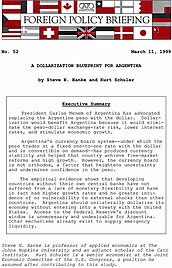President Carlos Menem of Argentina has advocated replacing the Argentine peso with the dollar. Dollarization would benefit Argentina because it would eliminate the peso-dollar exchange-rate risk, lower interest rates, and stimulate economic growth.
Argentina’s currency board system–under which the peso trades at a fixed one-to-one rate with the dollar and is convertible on demand–has produced currency stability and helped that country achieve free-market reforms and high growth. However, the currency board is not orthodox, a factor that heightens uncertainty and undermines confidence in the peso.
The empirical evidence shows that developing countries without their own central banks have not suffered from a lack of monetary flexibility and have in fact had higher growth rates and no greater incidence of or vulnerability to external shocks than other countries. Argentina should unilaterally dollarize its economy without entering into a treaty with the United States. Access to the Federal Reserve’s discount window is unnecessary and undesirable for Argentina. Other mechanisms already exist to supply emergency liquidity.
About the Authors

This work is licensed under a Creative Commons Attribution-NonCommercial-ShareAlike 4.0 International License.
